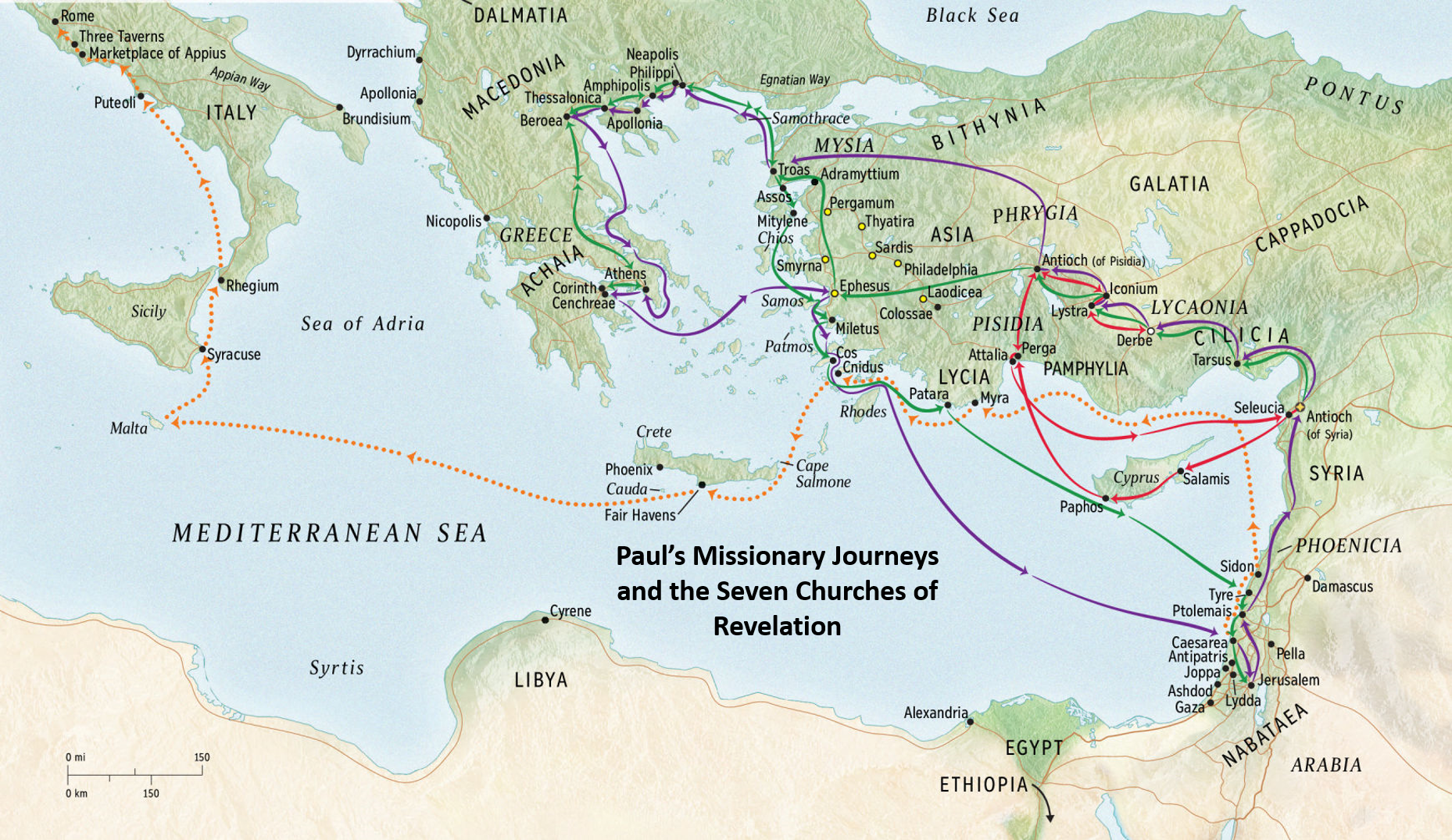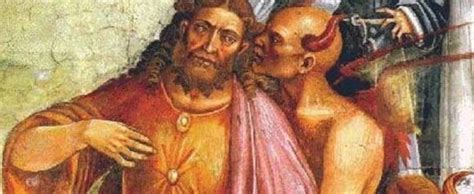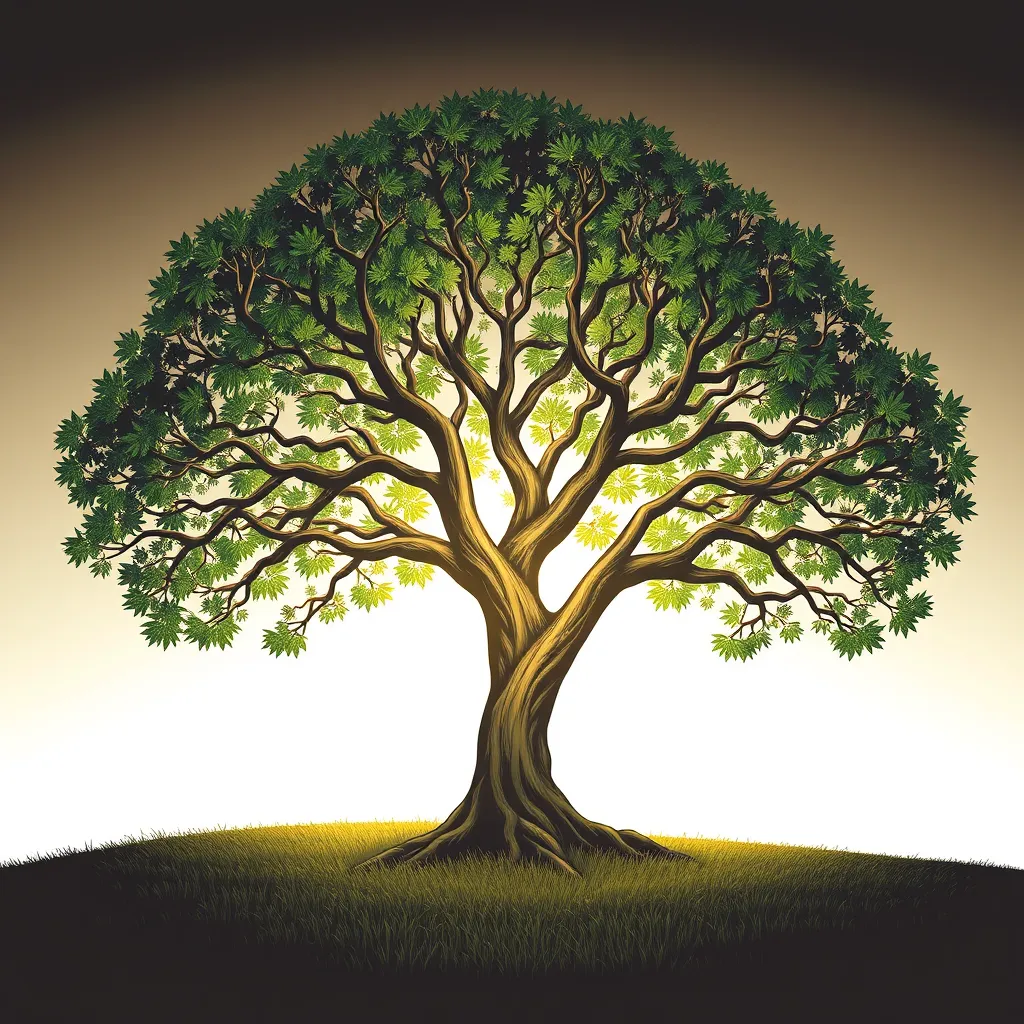
The Revelation is Sent To the Church in Ephesus

In Rev 1:11 John is instructed to send the Revelation to seven of the churches in the Roman province of Asia Minor. However, there were many other Christian communities in existence at the time John wrote to the seven mentioned:
Some Additional Christian Communities
- Antioch, Acts 11:26
- Iconium, Acts 16:2
- Lystra, Acts 16:2
- Troas, Acts 20:6
- Philippi, Phil 1:1
- Jerusalem, Acts 11:22
- Thessalonica, 1 Thess 1:1
- Berea, Acts 17:13
- Colosse, Col 1:1-2
- Corinth, 1 Cor 1:2
- Rome, Rom 1:7
It’s interesting to compare some of the characteristics of each of the seven ancient churches to different stages of Church development throughout history. Even present-day churches could be labeled as “being like” the fellowship in Sardis, Ephesus, or others of the seven. This is another example of God’s eternal truths and principles at work. While the Revelation is addressed historically to the turbulent events about to break like a flash flood on the ancient Church, the principles expressed in the symbols and images are also applicable to the Church in every age.
John doesn’t claim to be foretelling the full scope of church history (with the exception of the promise of Christ’s Second Coming). He claims that the purpose of the vision is to show what must soon take place (1:1), because the time is near (1:3).
On the other hand, the significance of seven churches in a revelation packed with symbolic numbers and images shouldn’t be overlooked. As explored earlier, the number seven indicates:
- Spiritual perfection,
- qualitative fullness,
- completeness,
- the essential nature of a thing.
(*All Bible references are from the NIV unless otherwise noted)
Chapter 2:1-7
1 To the angel of the church in Ephesus write: These are the words of him who holds the seven stars in his right hand and walks among the seven golden lampstands.
2 I know your deeds, your hard work and your perseverance. I know that you cannot tolerate wicked people, that you have tested those who claim to be apostles but are not, and have found them false.
3 You have persevered and have endured hardships for my name, and have not grown weary.
4 Yet I hold this against you: You have forsaken the love you had at first.
5 Consider how far you have fallen! Repent and do the things you did at first. If you do not repent, I will come to you and remove your lampstand from its place.
6 But you have this in your favor: You hate the practices of the Nicolaitans, which I also hate.
7 Whoever has ears, let them hear what the Spirit says to the churches. To the one who is victorious, I will give the right to eat from the tree of life, which is in the paradise of God.
Rev 2:1
To the angel of the church in Ephesus write:
Review Rev 1:20. The stars Christ holds in his hand are identified as the leaders or pastors of the seven churches, and the lampstands as the seven churches.
Rev 2:2
I know your deeds, your hard work and your perseverance:
Note the characteristics Christ identifies in the Ephesian church and how they can apply to the church in any age.
- Hard work
- Perseverance
- Avoid wicked people
- Test false leaders
- Endure hardship for Christ
Rev 2:2
You have tested those who claim to be apostles but are not:

From the very beginning, the infant church was warned about those who would corrupt the words of Jesus for their own gain:
Matthew 7:15 “Watch out for false prophets. They come to you in sheep’s clothing, but inwardly they are ferocious wolves.
Matthew 24:11 and many false prophets will appear and deceive many people.
Matthew 24:24 For false messiahs and false prophets will appear and perform great signs and wonders to deceive, if possible, even the elect.
2 Peter 2:1 But there were also false prophets among the people, just as there will be false teachers among you. They will secretly introduce destructive heresies, even denying the sovereign Lord who bought them—bringing swift destruction on themselves.
1 John 4:1 Dear friends, do not believe every spirit, but test the spirits to see whether they are from God, because many false prophets have gone out into the world.
1 Timothy 6:20 Timothy, guard what has been entrusted to your care. Turn away from godless chatter and the opposing ideas of what is falsely called knowledge…
From the church’s inception, there were those who struggled to reconcile their pagan heritage with Jesus’ teachings. Many new believers from Greek backgrounds had difficulty conceiving of a perfect spiritual God taking on material flesh. Greek philosophy saw things of the spiritual world as pure and perfect, while the material world was imperfect and corrupt. As a result, some teachers twisted the Apostle’s teachings into a strange concoction of Greek philosophy and eastern mysticism. They taught that Jesus could not have been a physical being and spiritually pure at the same time. Therefore, he only “appeared” to be human and die – he was a spirit being playing the part of a human.

Gnostics believed that to gain salvation a person had to be privy to secret gnosis (knowledge), understood only by a select few. Many scholars see John’s Gospel and letters as a defense against these false teachings, emphatically affirming Jesus’ divine nature, physical appearance on earth, his physical death, and miraculous resurrection.
Dozens of Gnostic manuscripts have been discovered, including The Acts of Thomas, The Acts of Peter, and The Secret Gospel of Mark. Most can be read online by researching Gnosticism (see Appendix for a summary).
Rev 2:4
You have forsaken the love you had at first:
The call to selfless love, justice, and charity has been sounded throughout the ages:
Isa 10:1-2 Woe to those who decree iniquitous decrees, and the writers who keep writing oppression, to turn aside the needy from justice and to rob the poor of my people of their right, that widows may be their spoil, and that they may make the fatherless their prey! (ESV2011)
Ezek 22:29 The people of the land have practiced extortion and committed robbery. They have oppressed the poor and needy, and have extorted from the sojourner without justice. (ESV2011)
Zech 7:10 …do not oppress the widow, the fatherless, the sojourner, or the poor, and let none of you devise evil against another in your heart.” (ESV2011)
Matt 22:35-40 35 And one of them, a lawyer, asked him a question to test him.36 “Teacher, which is the great commandment in the Law?” 37 And he said to him, “You shall love the Lord your God with all your heart and with all your soul and with all your mind. 38 This is the great and first commandment. 39 And a second is like it: You shall love your neighbor as yourself. 40 On these two commandments depend all the Law and the Prophets.” (ESV2011)
The group of believers in Ephesus had evidently allowed this spiritual love of others and God to grow somewhat cold.
Rev 2:5
If you do not repent, I will … remove your lampstand:

If the Church is to be a light to the world, consider what the removal of their lampstand symbolizes. Jesus said that the Good News of God’s redemption was to be a great light in the darkness of a world steeped in the superstitions and hopelessness of paganism!
Matt 4:16 …the people living in darkness have seen a great light; on those living in the land of the shadow of death a light has dawned.”
Matt 5:15 Neither do people light a lamp and put it under a bowl. Instead they put it on its stand, and it gives light to everyone in the house. 16 In the same way, let your light shine before others, that they may see your good deeds and glorify your Father in heaven.
Christ’s warnings were given initially to John’s seven churches, but they apply equally to the church in any age.
Rev 2:6
You hate the practices of the Nicolaitans…
The Nicolaitans may have been a group of believers who continued to struggle with separating their newfound Christian beliefs from their previous pagan practices. The Early Church Fathers Irenaeus (AD c.130 – c. 202), and Tertullian (AD c.155-c.220) wrote:
Irenaeus, Against Heresies, vol. 1, 26:3 The Nicolaitans are the followers of that Nicolas who was one of the seven first ordained to the diaconate by the apostles. They lead lives of unrestrained indulgence. The character of these men is very plainly pointed out in the Apocalypse of John, [when they are represented] as teaching that it is a matter of indifference to practice adultery, and to eat things sacrificed to idols.
Tertullian, Prescription against Heretics, 33 John, however, in the Apocalypse, is charged to chastise those who eat things sacrificed to idols, and who commit fornication. There are even now another sort of Nicolaitans. Theirs is called the Gaian heresy. But in [John’s] epistle, he especially designates those as Antichrists who denied that Christ had come in the flesh (1 John 4:3) and who refused to think that Jesus was the Son of God.
Compare these observations to Peter’s warning:
2Pet 2:14 With eyes full of adultery, they never stop sinning; they seduce the unstable; they are experts in greed—an accursed brood! 15 They have left the straight way and wandered off to follow the way of Balaam son of Bezer, who loved the wages of wickedness. 16 But he was rebuked for his wrongdoing by a donkey—an animal without speech—who spoke with a human voice and restrained the prophet’s madness. 17 These people are springs without water and mists driven by a storm. Blackest darkness is reserved for them. 18 For they mouth empty, boastful words and, by appealing to the lustful desires of the flesh, they entice people who are just escaping from those who live in error. 19 They promise them freedom, while they themselves are slaves of depravity—for “people are slaves to whatever has mastered them.”
Rev 2:7
To the one who is victorious:
The Greek word translated here as “victorious”, is, nikaō, which means to subdue, conquer, overcome, prevail, to get the victory. Note the rewards that an overcomer is promised:
1 John 5:5 Who is it that overcomes the world? Only the one who believes that Jesus is the Son of God.
Rev 3:5 The one who is victorious will, like them, be dressed in white. I will never blot out the name of that person from the book of life, but will acknowledge that name before my Father and his angels.
Rev 2:17 Whoever has ears, let them hear what the Spirit says to the churches. To the one who is victorious, I will give some of the hidden manna. I will also give that person a white stone with a new name written on it, known only to the one who receives it.

Rev 2:7
I will give the right to eat from the tree of life, which is in the paradise of God:
There are several definitions given for the “tree of life” in the following verses:

Gen 2:9 The LORD God made all kinds of trees grow out of the ground—trees that were pleasing to the eye and good for food. In the middle of the garden were the tree of life and the tree of the knowledge of good and evil.
Prov 3:18 [Wisdom] is a tree of life to those who take hold of her; those who hold her fast will be blessed.
Prov 11:30 The fruit of the righteous is a tree of life, and the one who is wise saves lives.
Prov 13:12 Hope deferred makes the heart sick, but a longing fulfilled is a tree of life.
Prov 15:4 The soothing tongue is a tree of life, but a perverse tongue crushes the spirit.
Following this Old Testament pattern, many other Christian virtues could be called a “tree of life” further describing this spiritual concept.
Rev 22:2 On each side of the river stood the tree of life, bearing twelve crops of fruit, yielding its fruit every month. And the leaves of the tree are for the healing of the nations. 3 No longer will there be any curse. The throne of God and of the Lamb will be in the city, and his servants will serve him. 4 They will see his face, and his name will be on their foreheads. 5 There will be no more night. They will not need the light of a lamp or the light of the sun, for the Lord God will give them light. And they will reign for ever and ever.
Rev 2:7
Paradise of God:
According to Walter Elwell, paradise is a Persian loanword for an area enclosed by a wall, a garden, an orchard, or a park. The Hebrew word gan (garden, orchard, park) is used in many Old Testament verses. For example:
Gen 2:8 Now the LORD God had planted a garden in the east, in Eden; and there he put the man he had formed.
Eccl 2:5 I made gardens and parks and planted all kinds of fruit trees in them.
For many in Jesus’ day, the term had become synonymous with the bosom of Abraham (Luke 16:19-25), the celestial resting place of righteous souls after death. The Greek, paradeisos1 conveys this concept of a heavenly abode:
Luke 23:43 Jesus answered him, “Truly I tell you, today you will be with me in paradise.”
2Cor 12:3 3 And I know that this man—whether in the body or apart from the body I do not know, but God knows—4 was caught up to paradise and heard inexpressible things, things that no one is permitted to tell.
Footnotes
- Strong’s G3857. ↩︎
*All Scripture quotations, unless otherwise indicated, are taken from the Holy Bible, New International Version®, NIV®. Copyright ©1973, 1978, 1984, 2011 by Biblica, Inc.™ Used by permission of Zondervan. All rights reserved worldwide. www.zondervan.comThe “NIV” and “New International Version” are trademarks registered in the United States Patent and Trademark Office by Biblica, Inc.™





